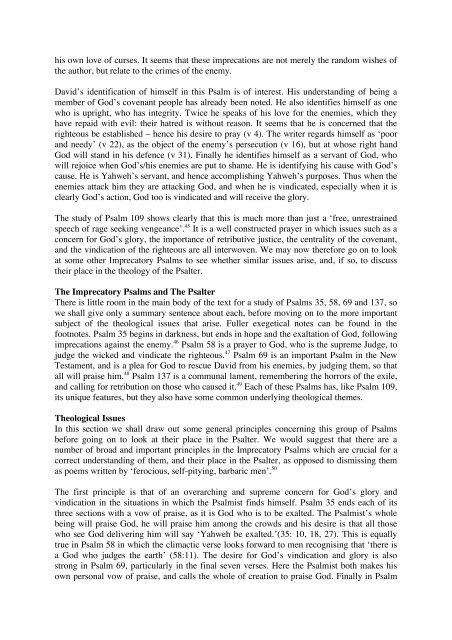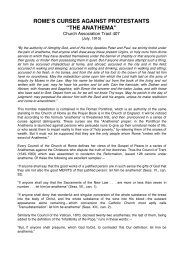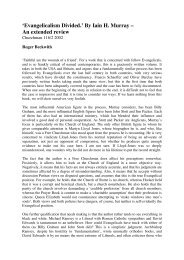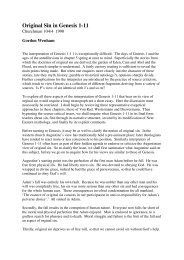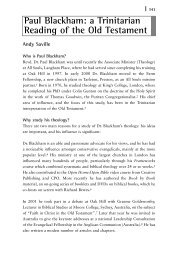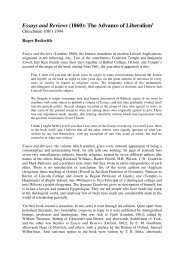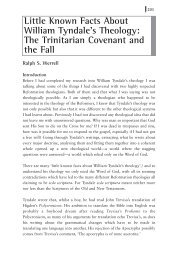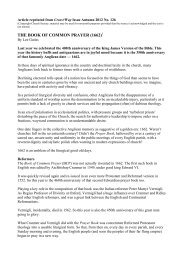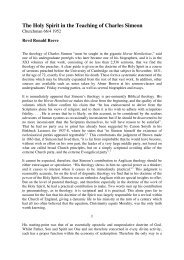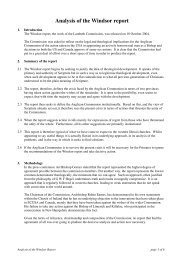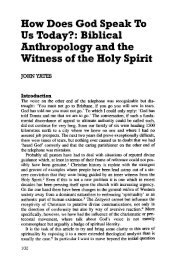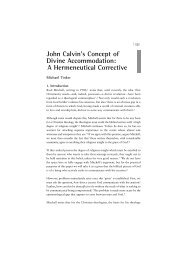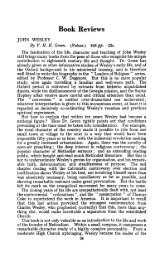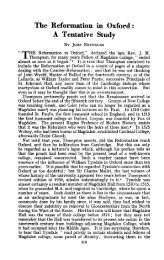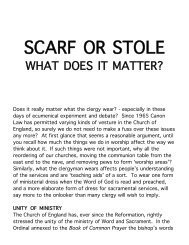The Place of the Imprecatory Psalms in the Canon ... - Church Society
The Place of the Imprecatory Psalms in the Canon ... - Church Society
The Place of the Imprecatory Psalms in the Canon ... - Church Society
Create successful ePaper yourself
Turn your PDF publications into a flip-book with our unique Google optimized e-Paper software.
his own love <strong>of</strong> curses. It seems that <strong>the</strong>se imprecations are not merely <strong>the</strong> random wishes <strong>of</strong><br />
<strong>the</strong> author, but relate to <strong>the</strong> crimes <strong>of</strong> <strong>the</strong> enemy.<br />
David’s identification <strong>of</strong> himself <strong>in</strong> this Psalm is <strong>of</strong> <strong>in</strong>terest. His understand<strong>in</strong>g <strong>of</strong> be<strong>in</strong>g a<br />
member <strong>of</strong> God’s covenant people has already been noted. He also identifies himself as one<br />
who is upright, who has <strong>in</strong>tegrity. Twice he speaks <strong>of</strong> his love for <strong>the</strong> enemies, which <strong>the</strong>y<br />
have repaid with evil: <strong>the</strong>ir hatred is without reason. It seems that he is concerned that <strong>the</strong><br />
righteous be established – hence his desire to pray (v 4). <strong>The</strong> writer regards himself as ‘poor<br />
and needy’ (v 22), as <strong>the</strong> object <strong>of</strong> <strong>the</strong> enemy’s persecution (v 16), but at whose right hand<br />
God will stand <strong>in</strong> his defence (v 31). F<strong>in</strong>ally he identifies himself as a servant <strong>of</strong> God, who<br />
will rejoice when God’s/his enemies are put to shame. He is identify<strong>in</strong>g his cause with God’s<br />
cause. He is Yahweh’s servant, and hence accomplish<strong>in</strong>g Yahweh’s purposes. Thus when <strong>the</strong><br />
enemies attack him <strong>the</strong>y are attack<strong>in</strong>g God, and when he is v<strong>in</strong>dicated, especially when it is<br />
clearly God’s action, God too is v<strong>in</strong>dicated and will receive <strong>the</strong> glory.<br />
<strong>The</strong> study <strong>of</strong> Psalm 109 shows clearly that this is much more than just a ‘free, unrestra<strong>in</strong>ed<br />
speech <strong>of</strong> rage seek<strong>in</strong>g vengeance’. 45 It is a well constructed prayer <strong>in</strong> which issues such as a<br />
concern for God’s glory, <strong>the</strong> importance <strong>of</strong> retributive justice, <strong>the</strong> centrality <strong>of</strong> <strong>the</strong> covenant,<br />
and <strong>the</strong> v<strong>in</strong>dication <strong>of</strong> <strong>the</strong> righteous are all <strong>in</strong>terwoven. We may now <strong>the</strong>refore go on to look<br />
at some o<strong>the</strong>r <strong>Imprecatory</strong> <strong>Psalms</strong> to see whe<strong>the</strong>r similar issues arise, and, if so, to discuss<br />
<strong>the</strong>ir place <strong>in</strong> <strong>the</strong> <strong>the</strong>ology <strong>of</strong> <strong>the</strong> Psalter.<br />
<strong>The</strong> <strong>Imprecatory</strong> <strong>Psalms</strong> and <strong>The</strong> Psalter<br />
<strong>The</strong>re is little room <strong>in</strong> <strong>the</strong> ma<strong>in</strong> body <strong>of</strong> <strong>the</strong> text for a study <strong>of</strong> <strong>Psalms</strong> 35, 58, 69 and 137, so<br />
we shall give only a summary sentence about each, before mov<strong>in</strong>g on to <strong>the</strong> more important<br />
subject <strong>of</strong> <strong>the</strong> <strong>the</strong>ological issues that arise. Fuller exegetical notes can be found <strong>in</strong> <strong>the</strong><br />
footnotes. Psalm 35 beg<strong>in</strong>s <strong>in</strong> darkness, but ends <strong>in</strong> hope and <strong>the</strong> exaltation <strong>of</strong> God, follow<strong>in</strong>g<br />
imprecations aga<strong>in</strong>st <strong>the</strong> enemy. 46 Psalm 58 is a prayer to God, who is <strong>the</strong> supreme Judge, to<br />
judge <strong>the</strong> wicked and v<strong>in</strong>dicate <strong>the</strong> righteous. 47 Psalm 69 is an important Psalm <strong>in</strong> <strong>the</strong> New<br />
Testament, and is a plea for God to rescue David from his enemies, by judg<strong>in</strong>g <strong>the</strong>m, so that<br />
all will praise him. 48 Psalm 137 is a communal lament, remember<strong>in</strong>g <strong>the</strong> horrors <strong>of</strong> <strong>the</strong> exile,<br />
and call<strong>in</strong>g for retribution on those who caused it. 49 Each <strong>of</strong> <strong>the</strong>se <strong>Psalms</strong> has, like Psalm 109,<br />
its unique features, but <strong>the</strong>y also have some common underly<strong>in</strong>g <strong>the</strong>ological <strong>the</strong>mes.<br />
<strong>The</strong>ological Issues<br />
In this section we shall draw out some general pr<strong>in</strong>ciples concern<strong>in</strong>g this group <strong>of</strong> <strong>Psalms</strong><br />
before go<strong>in</strong>g on to look at <strong>the</strong>ir place <strong>in</strong> <strong>the</strong> Psalter. We would suggest that <strong>the</strong>re are a<br />
number <strong>of</strong> broad and important pr<strong>in</strong>ciples <strong>in</strong> <strong>the</strong> <strong>Imprecatory</strong> <strong>Psalms</strong> which are crucial for a<br />
correct understand<strong>in</strong>g <strong>of</strong> <strong>the</strong>m, and <strong>the</strong>ir place <strong>in</strong> <strong>the</strong> Psalter, as opposed to dismiss<strong>in</strong>g <strong>the</strong>m<br />
as poems written by ‘ferocious, self-pity<strong>in</strong>g, barbaric men’. 50<br />
<strong>The</strong> first pr<strong>in</strong>ciple is that <strong>of</strong> an overarch<strong>in</strong>g and supreme concern for God’s glory and<br />
v<strong>in</strong>dication <strong>in</strong> <strong>the</strong> situations <strong>in</strong> which <strong>the</strong> Psalmist f<strong>in</strong>ds himself. Psalm 35 ends each <strong>of</strong> its<br />
three sections with a vow <strong>of</strong> praise, as it is God who is to be exalted. <strong>The</strong> Psalmist’s whole<br />
be<strong>in</strong>g will praise God, he will praise him among <strong>the</strong> crowds and his desire is that all those<br />
who see God deliver<strong>in</strong>g him will say ‘Yahweh be exalted.’(35: 10, 18, 27). This is equally<br />
true <strong>in</strong> Psalm 58 <strong>in</strong> which <strong>the</strong> climactic verse looks forward to men recognis<strong>in</strong>g that ‘<strong>the</strong>re is<br />
a God who judges <strong>the</strong> earth’ (58:11). <strong>The</strong> desire for God’s v<strong>in</strong>dication and glory is also<br />
strong <strong>in</strong> Psalm 69, particularly <strong>in</strong> <strong>the</strong> f<strong>in</strong>al seven verses. Here <strong>the</strong> Psalmist both makes his<br />
own personal vow <strong>of</strong> praise, and calls <strong>the</strong> whole <strong>of</strong> creation to praise God. F<strong>in</strong>ally <strong>in</strong> Psalm


